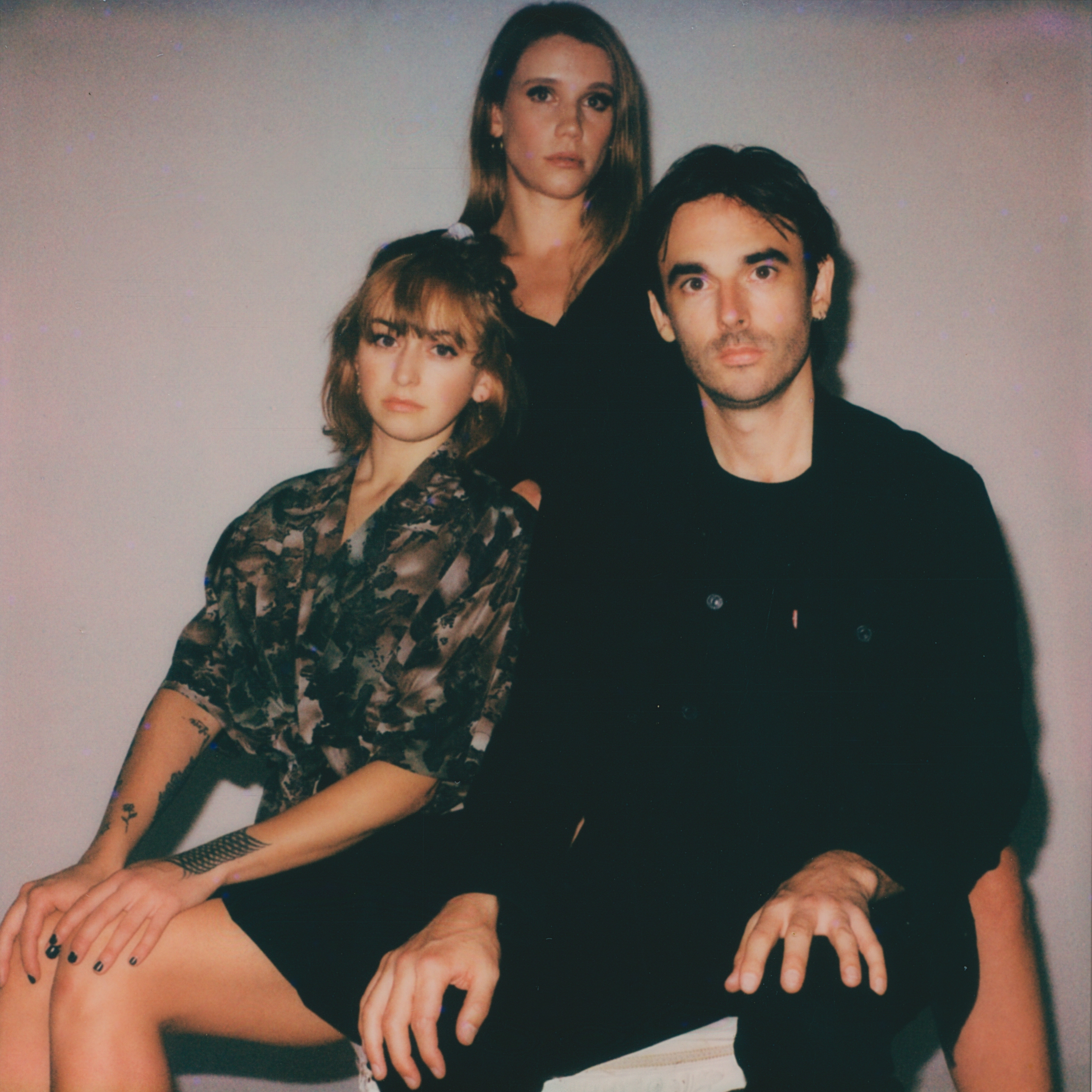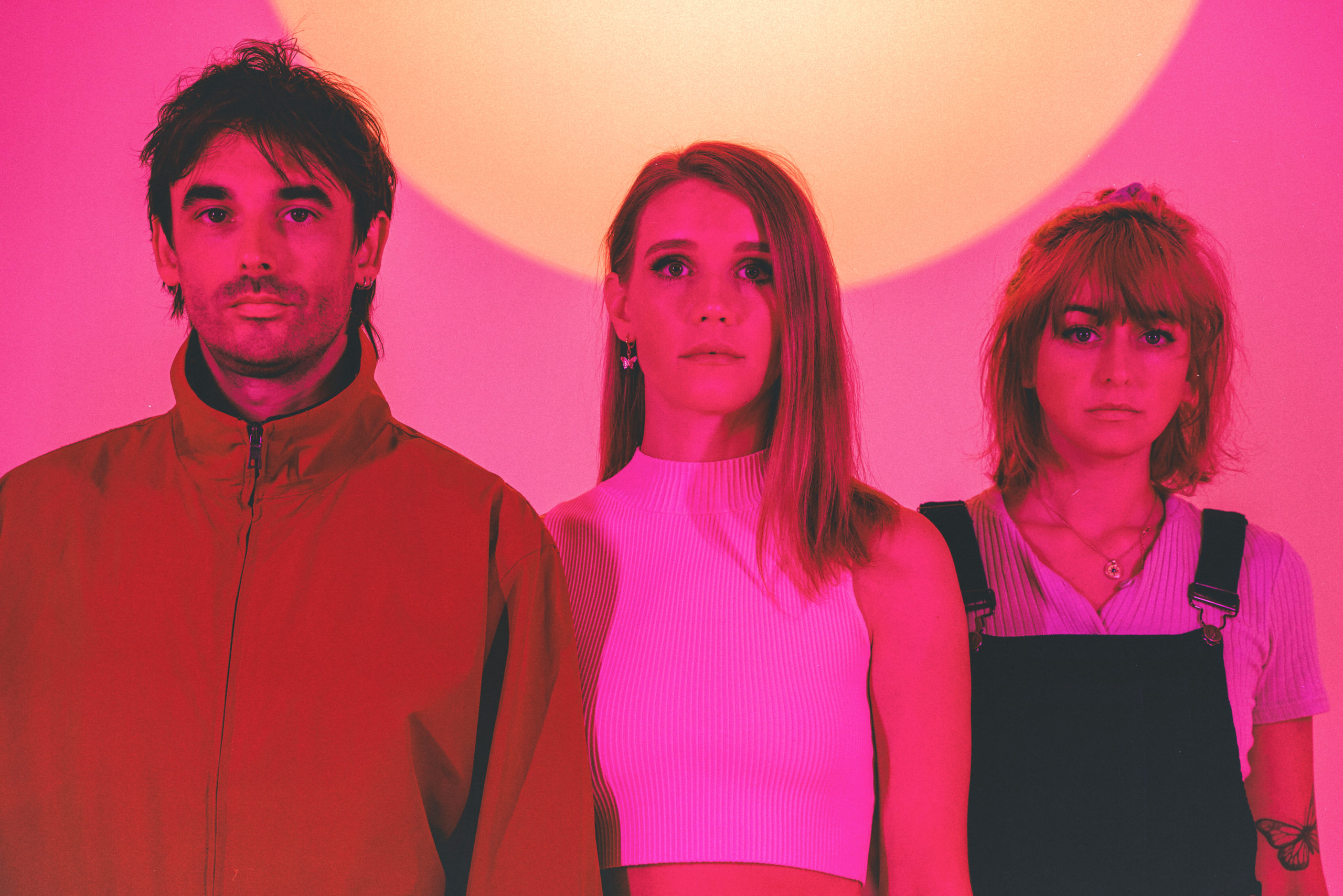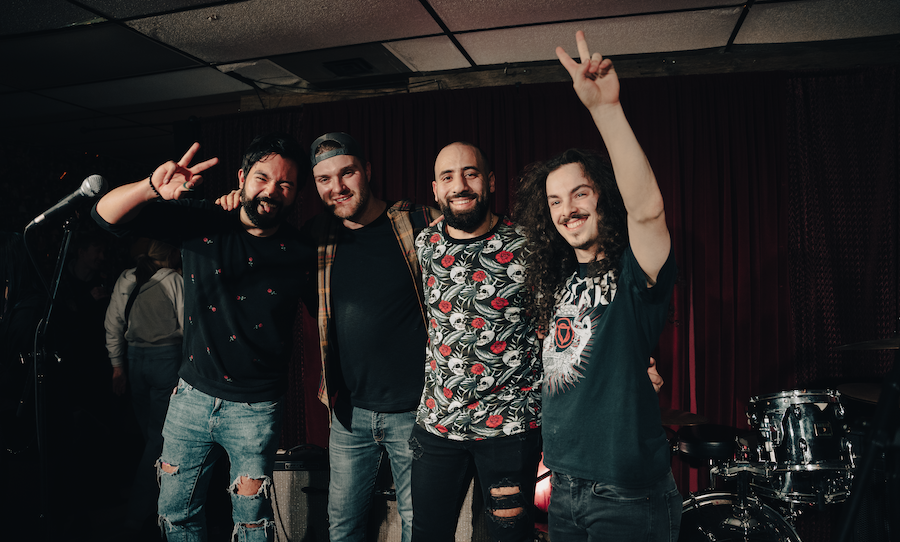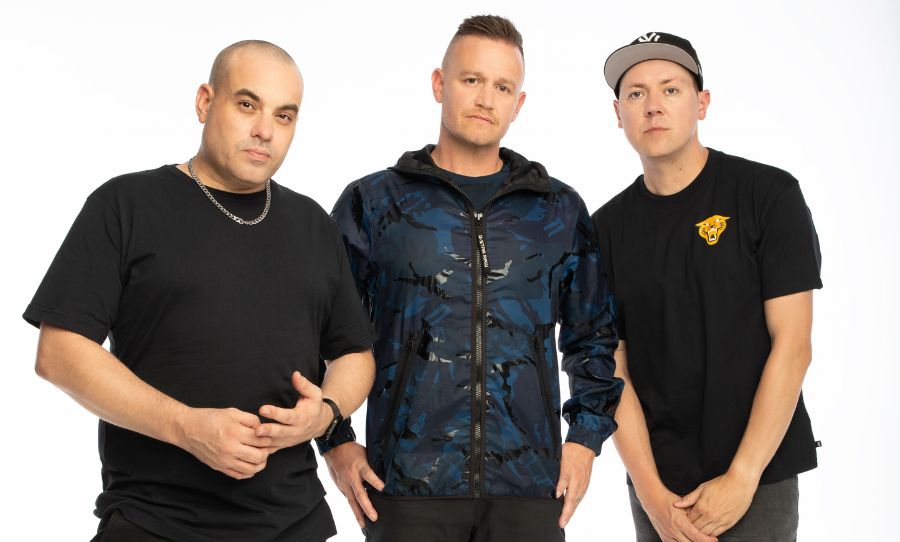Good As What You Give is an emotional, introspective single that has been poured out from a place of vulnerability.
The phenomenal three-piece band, I Know Leopard, were separated for too long but the solitude has resulted in a melodic masterpiece straight from Luke O’Loughlin’s self-contemplation. Good As What You Give has been perfectly completed with Jenny McCullagh’s violin lightly dancing underneath Luke’s vocals and billowing piano and Rosie Fitzgerald’s bass brings it all together.
The new single is a true testament to Luke’s production skills as he co-produced Good As What You Give with The Belligerents’ Konstantin Kersting.

Along with this tender track, the band are excited to announce they can finally go ahead with their much-delayed live dates in Melbourne and Sydney.
Luke told us about how he’s exploring new skills deeper than ever before and how his ever-changing journey through life influences the way he creates.
HAPPY: So, let’s chat about your new song.
LUKE: Let’s chat.
HAPPY: I love it, just to start. It is amazing. It sounds really beautiful. So I know that you released three new tracks this year and one of which Day 2 Day was released throughout the lockdown. You guys recorded that in the lockdown as well, right?
LUKE: Yeah, we did. Yeah. Well, obviously we recorded it the best way we could considering the circumstances. But yeah, those songs were basically… all the songs that we put out this year are just a selection of a whole batch of stuff that I was kind of writing in 2020 when lockdown hit. And yeah, so I kind of did all the production and recording and stuff myself. And then we went up to like a place in… when things kind of started relaxing a bit. We wanted to work with Konstantin Kersting, who’s a producer from Brisbane, who’s done lots of smash hits like (?). But we’re also big fans of his band Belligerents and always loved how that sounded and everything. So yeah, we obviously couldn’t go over there. But yeah, we got creative and kind of went to a nice house like Jenny’s family house on the Central Coast, and we just did it via Zoom and through this software, we didn’t even know existed where you can basically kind of… because, you know, you can hear his mixes kind of in perfect audio quality and with little to no latency. So it was like, ‘Oh my God’. Technology blew our minds, but it was just a great way… like an awesome way to do it. You know, it was important for us to kind of getaway as well from everything and kind of be together and, you know, on that whole mix process. But yeah, it was really this time very much like a, you know… I mean, I’d done for the album and stuff we’d done before, I’d always kind of done a bit of production. But this time I kind of took on most of the production work myself, just out of necessity really, for under the circumstances. But it was a really good learning experience for me. And, you know, I’m much deeper into production in audio than I’ve ever been before. And yeah, nerding out on it, you know, very frequently.

HAPPY: Yeah, definitely. Did you enjoy having a bit more creative control because of that as well?
LUKE: Yeah, yeah, definitely. I do think it’s kind of how we’re going to operate from now on just because, yeah, we just kind of know we’ve always… we’ve always been pretty… what’s the word… specific about, you know, how things should sound like for anything we’ve ever released. So yeah, it’s definitely nice to have that control. But I mean, that’s something we’ll probably talk about later. It’s kind of because I am trying to… we are trying to kind of get back into more of a band way of recording at the moment, because I’m kind of craving having people around and, you know what I mean? Like working with other people again, you know?
HAPPY: Yeah. So was Good As What You Give written while you guys were away up at that location?
LUKE: No, no, it wasn’t. So that was just like, Good As What You Give and Day 2 Day and a bunch of other songs were all kind of… I kind of wrote them myself just, you know, in lockdown and just kind of tracked as much as I could. And then towards the end, when we were about to go do this thing with this Zoom thing on the Central Coast with Kon for mixing, that’s when I kind of got Jenny and Rosie in, to record the bass parts and violin parts and vocals and stuff. So yeah, these ones were very much like kind of… yeah, it was a lot of me in this time round, which, yeah, which was great, and it helped me hone skills and get better as a producer. But yeah, as I was saying, like I’m really craving getting back to being way more collaborative with the girls, you know, because yeah, as much as I love these songs, I feel like there’s kind of almost that… you know, I mean, I know Leopard is a band, and I think that when things for our album, for example, when things really started to work and they really started to take shape when we all started getting in a room and playing together, and all those kind of nuances in the personality and everybody’s playing and their musicianship. It just really… it forms that personality or identity of the band.
HAPPY: Yeah, of course. I think that it’s probably, it’s quite obvious as well that you were doing it on your own in terms of melodically and lyrically, as you said, it’s a ballad and you did mention that it was something you’ve avoided really doing, but you’d find natural in terms of a writing style as ballads. So it is quite a vulnerable piece. Do you think that was just probably due to being alone for so long in lockdown?
LUKE: Yeah, I don’t know. I think I’ve just been going through a weird kind of stage in my life at the moment where… and you can’t talk about it without the context of lockdown, obviously. But I think like at the beginning of 2020 or the end of late 2019, around that time, I’d kind of had come out of a relationship and I had this like … I don’t know. I used to, you know… I’ve got these really, really tight friends who are big, like musical community for me who have that band These New South Wales that I used to be a part of. And they were all my kind of closest friends, tight-knit musical community. And they all kind of did this mass exodus down to Melbourne. And I think I came out of my relationship and I was like, ‘Oh God, like all my community is gone’. And then all of a sudden it’s like diving into lockdown. So there was a lot of like a lot of alone time, definitely. So, you know, because I was kind of living by myself and I think just even without lockdown, like over the last couple of years, I’ve kind of been experiencing this kind of regression from being normally a quite outgoing, extroverted person to becoming very introspective. And that’s from spending obviously a lot of time alone. But also it’s just, yeah, I think it’s been this thing where I haven’t really… and that’s what Good As What You Give is about, really. It’s about kind of like trying to reconnect with the world around me again and reconnecting with those people that, you know, in the past, I’ve kind of just let it go, and I haven’t kind of maintained those friendships and relationships. And I’ve sunk and withdrawn too much and sunk in so deep into myself that I’ve kind of forgotten about that. And it’s that really… it’s a pretty corny, almost old adage of like, you know, you get what you give type thing. Yeah, but it rings so true to me, and I think I’ve been really trying to kind of have this… been trying to overcome that and reach out to people and reconnect with the world around me just to yeah, to heal and to be a… I don’t know. To basically get back what you give.

HAPPY: No, I don’t think it’s corny. Yeah, it’s just something that I think people especially learn as they get older as well. You know, focus on your own work for so long.
LUKE: Yeah, exactly.
HAPPY: Was there anything in particular that you’ve been listening to, like any music that you had listened to years ago and just recently sparked up that may have influenced the writing as well musically? Just the ballad sense is very reminiscent of a few classics. It’s very cool.
LUKE: Yeah. Well, I’m not listening to as much yacht rock anymore, so that’s probably a good thing for everybody. But because, you know, that album was very much influenced by a lot of that stuff and not so much yacht rock. But, you know, even like singer-songwriter stuff from the 70s and whatever. But I think what has been a big influence on me has been like… I mean, this is for everybody, but that Phoebe Bridgers out album when it came out, Punisher. Yeah, I just remember. Like the first time, because I love that first album, but I didn’t fully get it… you know the Phoebe Bridgers thing until that Punisher album came out, and I just remember playing that because it came out during lockdown and it was just like, so cathartic for me. And it just like… I just burst into tears after like the second song, which is beautiful. I think what it was is like, what’s been that big influence? Because I’ve never really been much of a lyric person. I’ve always been about like melodies… like melody is king. And so it’s only recently that I’ve become… and probably because of Phoebe Bridges and from listening to that album so much, I’ve become so much more of a lyric person and that I care a lot more about lyrics now. And I think it’s just also what I love about her lyrics. It’s that perfect balance between kind of like abstract and literal. It’s like she’s talking about really intense stuff, and it’s obviously really personal and it’s conversational. But at the same time, there’s still that poetry to it. I’m not a big fan of like, just personally, of lyrics when they are just so literal and they’re like a conversation that you’re having with someone that’s sitting across from you. It’s just not… I like that kind of the poetry in the lyrics. But I think she just has that perfect balance of the two, and that made me really try and put a lot more effort into my lyric writing. And just to be okay with being vulnerable. I think that’s been a big thing for the last couple of songs, like I’ve never been more vulnerable in my lyric writing before. Like, you know, it’s a big step. I mean, look to be honest with you, I listen back to those songs and I know I’ll always listen back to them and go, ‘Oh my God, what a bloody misery guts I was at that time in my life.’ You know what I mean? And I feel like I have been a big misery guts. But it’s been therapeutic for me to kind of get it out there. I just only hope that I can kind of channel my better understanding and deep appreciation of lyrics into something more joyful, you know, in the future coming up, which I’m sure as life changes and things, events around you change you will. But yeah, definitely to answer that, I think Phoebe Bridges has been a really important influence. Just an incredible album. Not just like lyrically, but like texturally as well, I think as well. And I think that inspired some of the kind of soundscapes on the new stuff have been working on.
HAPPY: Yeah. I think you should be proud of yourself. You’ve really nailed it. It’s really cool.
LUKE: Oh, thanks. I think we’ve stopped caring a bit as well, which I think… I know that sounds weird, but I think we’ve stopped like chasing something. We’ve been around for so long now, really like, I mean, I’ve only had one album, but we’ve had a few EP’s and it’s just like, we take a while to make music. But we now have this kind of point where we’re not really chasing any kind of career goals or whatever as a band or like any particular accolades or things like that. It’s now, you know, we are the three of us just love working together. We love writing together. We all do different things, like Jenny and Rosie, I mean, they’re just some of the most sought after musicians in different acts going on. But it’s just awesome because we all love kind of getting back together. It feels like home when we’re together and we can just work on music now that we love. And I mean, our music tastes for me changes every week, but we’re just going to keep doing whatever we feel like. I think it’s been nice to not care so much.
HAPPY: Definitely. On that then, are you excited to get back on tour together, just having a close quarters and being around people?

LUKE: Oh, absolutely. It was interesting because when like at the beginning of… when was the first lockdown was, like March or something?
HAPPY: February and March?
LUKE: Yeah, right. So when that happened, we had been touring and just playing pretty solidly for a year… or not a year. Yeah, pretty much a year. And just because it was the whole album cycle thing, we just have to go really hard for that year. But we got… I think the last show that we played was this Day on the Green Tour and we were supporting Rick Astley and Aha. So that was the last show that we did. Yeah, and I just remember thinking like, ‘Oh, I’m actually kind of glad that this is happening now because I’m pretty exhausted and I’m kind of sick of playing live for the moment’. So I kind of welcomed the break. But that was the last time we played, and that was like really two years ago. And I really have been craving it, like really craving kind of getting on stage. I’m terrified because it just feels like another life ago that we were doing that. I’ve got to relearn how to do that. But I think it’ll come back. It’ll be in the muscle memory. But it’s yeah, I can’t wait. I’m really excited. Everyone is.
HAPPY: And do you think just because Good As What You Give is such a different change in Vibe, do you think that it’ll have a different kind of reaction from the audience as well? For your live shows, can you imagine anyone getting their phone screens out, maybe doing a little sway?
LUKE: I don’t know. It seems… yeah, maybe. I mean, it feels like Good As What You Give is almost like a bit of a cousin of another song that we had on our album called Everything Goes With You, which was the kind of closest thing to a ballad on the album, which is like a piano, you know, kind of four-chord piano ballad has that sway thing. And I think, yeah, it’s interesting you said it because whenever we played Everything Goes With You on tour, we did have a bit of like the camera phone thing going on. Yeah, so maybe, yeah, yeah, definitely. It’s got that same kind of energy. I mean, I hope so. It’s been really nice to hear people, you know, like the feedback that they’ve really connected to it. And yeah, it’s nice when people kind of say that, ‘I can’t stop listening, but I can’t stop crying either.’ It’s like, it’s nice to hear that people are having that kind of cathartic experience with it.
HAPPY: Yeah, yeah, definitely. I’m so glad. It’s been a pleasure to speak to you. I think I’ve got to wrap up now anyway.
LUKE: OK, no worries. I hope I didn’t rant too much.
HAPPY: No, that was perfect, honestly. Couldn’t ask for anything better. You’re amazing. The song is really fantastic, and I personally am looking forward to seeing it live.

‘Good As What You Give’ is out now.
Interviewed by Chloe Maddren.
Photos supplied.



